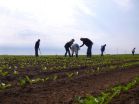INFORMATION:
Bodyguards for precious seeds
Without chemical mace
2015-05-19
(Press-News.org) The fungi (Rhizoctonia solani) is stealthy blight, becoming visible only shortly before the harvest infesting beets or corn at their roots. The fungal rot begins early in the season, working its way from the inside out, and only becoming visible in the fall, destroying the possibility of a harvest. Year after year crop failures due to attacks by pests and pathogens are reported in the media despite their being treated with pesticides. Crop failure is further exacerbated by pesticide treatments which cause the death of insects such as bees through neonicotinoids. "There are also more extreme environmental conditions such as periods of hot weather, drought or flood disasters, to be taken into account when considering the ex-tent of damage caused by pesticide use alone", states ACIB researcher Christin Zachow.
The Austrian Centre of Industrial Biotechnology (ACIB) is perfecting protective methods which will make the use of "chemical mace" measures obsolete. One such research project currently underway involves biological plant protection, in which microorganisms (bacteria) work as bodyguards for the safeguarding of seeds like corn, canola, tomato, sorghum, or sugar beet. The underlying principle is that special bacteria are planted in combination with the plant seeds in fields. ACIB engages the growth promoting properties of microorganisms: while the seed germinates, the microorganisms are simultaneously developing and supply-ing the plant with nutrients, promoting growth, warding off pests, reducing the stress on the crop and increasing their resilience.
"Crops are challenged by climate change, drought, and high salted floors. These nutrient deficiencies occur as a result of monoculture practices", states Christin Zachow. Since 2011, Christin Zachow has been managing project research and delivery in collaboration with Prof. Gabriele Berg - a pioneer in this research field - from the Institute for Environmental Bio-technology at Graz University of Technology. Their primary task has been to find bacteria that are adapted to extreme environmental conditions. Every plant needs specific bacteria, and every soil type harbors specific bacteria. For example, researchers who work in the areas of moss and lichen research have found that the former tolerate acidic pH values and nutrient deficiencies, while the latter accept UV-light and drought. Bacteria that promote growth are identified, characterized and tested for their resistance to stress. "We want to know which genes are activated by which particular environmental conditions in order to ensure that the bacteria will be ideally matched with crops under the local conditions", states Zachow. When a promising population of bacteria is found, it is deliberately improved by re-searchers so that the "microbiome" will have an optimal outcome under their given environ-mental conditions. Success has been recorded with the bacterial species Pseudomonas poae and Stenotrophomonas rhizophila. While Stenotrophomonas caused an enormous burst of growth of crops in the salty steppe of Uzbekistan (300 % more than without microbiome treatment), Pseudomonas made a similarly positive impact in the sugar beet test field from ACIB's industry partner KWS SAAT SE in Germany. Five industrial enterprises are currently involved in the research project.
After finalizing the preliminary investigations, target bacteria have come into interaction with their prospective host plants. Zachow: "Plants are searching for exactly those types of bacteria that they need for perfect growth." The bacteria-host-interaction is similar to that which occurs in the human intestine, in which a specific microflora is beneficial to human health. The culmination of the research and development of a commercial product has led to the technique of enclosing a seed in a "bacterial hull". In moist soil types, the bacteria grow along with the germinating seed and at the same time protect it.
Our goal: "We strive to develop plants with optimal health to provide consumers with an optimal basis for a healthy diet", says the scientist, "a functioning biological plant protection system offers a viable alternative to pesticides." Biological plant protection is undeniably a significant step towards ensuring a biologically sound agricultural industry producing healthier food.
Ultimately, the ACIB method is in competition with conventional systems of pesticide driven "plant protection". The chemical industry turns over about 40 billion euros a year in chemical plant protection products worldwide, and a third of these chemicals ends up on the fields in the EU alone. There is a lot of money to be made using biological plant protection when more and more customers call for healthier food.
ELSE PRESS RELEASES FROM THIS DATE:
Griffon vultures are exposed to high concentrations of lead in their diets
2015-05-19
Because of their position on the food chain and their dietary habits, Griffon vultures from the Iberian Peninsula are exposed to accumulation of heavy metals in their tissues. A study benefiting from the participation of the Autonomous University of Barcelona reveals that, due to their diets, wild populations of Griffon vultures in Catalonia show the presence of a high amount of lead, which affects their immune systems and reproductive function.
The population of wild birds is subject to the dangers resulting from the presence of toxic elements in the environment. Even ...
International Clinical Trials Day: Investigating the benefits of 'sticky sperm' for IVF
2015-05-19
Scientists from the University of Leeds are investigating whether a molecule usually found in moisturisers and skin creams could improve IVF success rates in the UK.
Embryologists running a clinical trial at the University are investigating whether hyaluronic acid, normally found in beauty products which are designed to maintain elasticity in the skin and keep hair and joints hydrated, helps sperm stick to the human egg when it is released from the ovary.
The hyaluronic acid method relies on picking only mature and fertile sperm that stick to a specially coated plate ...
Fresh milk, off the grid
2015-05-19
Even though much of the population in developing countries is involved in agriculture, food security is virtually out of reach. Often the only resort is to purchase a cow, buffalo, or sheep, to provide a steady supply of fresh milk, a nutritious staple of a daily diet. But how to preserve it safely? Refrigeration and boiling are costly -- and often impossible due to sporadic electricity.
The answers may lie in new Tel Aviv University research published in Technology, which finds that short pulsed electric fields can be used to kill milk-contaminating bacteria. Through ...
Cognitive process speed in teen years affects depression risk in adulthood
2015-05-19
May 19, 2015 - Teens with slower performance on a test of "cognitive processing speed" are more likely to have depression and anxiety symptoms as adults, reports a paper in Psychosomatic Medicine: Journal of Biobehavioral Medicine, the official journal of the American Psychosomatic Society. The journal is published by Wolters Kluwer.
"Adolescents with slower processing speed may be at increased later risk of anxiety and depression," according to the new research by Catharine R. Gale, PhD, of Edinburgh University and colleagues. The results add new evidence that lower ...
Treating infants of mothers with opioid dependence -- rising rates, rising costs
2015-05-19
May 19, 2015 - As more infants are born to mothers with dependence on prescription pain medications, the costs of treatment for babies with neonatal abstinence syndrome (NAS) have increased dramatically, suggests a report in the March/April issue of the Journal of Addiction Medicine, the official journal of the American Society of Addiction Medicine. The journal is published by Wolters Kluwer.
"At our institution, costs associated with treating infants with NAS are exponentially higher than the costs associated with infants not affected," write Dr. Kay Roussos-Ross, ...
The life and death of beta cells
2015-05-19
This news release is available in German. Diabetes is one of the scourges of modern society, and the number of cases is rising every year. Already, there are over 380 million diabetics around the world. The International Diabetes Foundation estimates that by 2030, over half a billion people will be suffering from type 2 diabetes. Today, Switzerland has more than 430,000 diabetics, 40,000 of them with type 1 diabetes.
What both type 1 and type 2 diabetes have in common is a dying off of insulin-producing beta cells, which are found on the pancreas. This deprives the ...
New risk factor for pregnancies
2015-05-19
This news release is available in French.
Women who were born preterm have a higher risk of giving birth to preterm children, according to a study, published in the journal Obstetrics & Gynecology, from researchers of the CHU Sainte-Justine and the University of Montreal. The researchers demonstrated that 13% of women born before 37 weeks of gestation gave birth prematurely at least once, compared to 9.5% of women born at term. Interestingly, this figure increased to 14% in women born before 32 weeks. "The difference is not alarming considering that according to ...
DATECAN initiative publishes guidelines for time-to-event end point definitions in breast cancer trials
2015-05-19
The DATECAN initiative, Definition for the Assessment of Time-to-event Endpoints in CANcer trials, has published Guidelines for time-to-event end point definitions in breast cancer trials in a recent issue of the Annals of Oncology. Standardized definitions can help researchers to more easily compare the results of clinical trials. The guidelines developed by the DATECAN initiative can help researchers to have a more uniform usage of key endpoints in the design, conduct, and reporting of clinical trials for patients with breast cancer.
DATECAN was initiated by statisticians ...
Study reveals intestinal bacteria succession during recovery from cholera in Bangladesh
2015-05-19
A new study delineates a sequential pattern of changes in the intestinal microbial population of patients recovering from cholera in Bangladesh, findings that may point to ways of speeding recovery from the dangerous diarrheal disease. The report also finds what appear to be consistent differences between the gut microbial population - also called the microbiota - of individuals in developed countries like the U.S. and those the developing world and provides some of the most complete evidence that the gut microbiota usually return to normal after cholera infection. Their ...
Microclinics help keep Kenyan HIV patients in care
2015-05-19
A team led by researchers from UC San Francisco, Organic Health Response, and Microclinic International is reporting results of a study that showed significant benefits of microclinics -- an innovative intervention that mobilized rural Kenyan HIV patients' informal social networks to support their staying in care.
The results showed that microclinics cut in half the normal rate of disengagement from care, which was defined as missing a clinic appointment by 90 days or more, when compared to the control group, and reduced the perceived stigma of HIV by 25 percent within ...
LAST 30 PRESS RELEASES:
Scientists discover why we know when to stop scratching an itch
A hidden reason inner ear cells die – and what it means for preventing hearing loss
Researchers discover how tuberculosis bacteria use a “stealth” mechanism to evade the immune system
New microscopy technique lets scientists see cells in unprecedented detail and color
Sometimes less is more: Scientists rethink how to pack medicine into tiny delivery capsules
Scientists build low-cost microscope to study living cells in zero gravity
The Biophysical Journal names Denis V. Titov the 2025 Paper of the Year-Early Career Investigator awardee
Scientists show how your body senses cold—and why menthol feels cool
Scientists deliver new molecule for getting DNA into cells
Study reveals insights about brain regions linked to OCD, informing potential treatments
Does ocean saltiness influence El Niño?
2026 Young Investigators: ONR celebrates new talent tackling warfighter challenges
Genetics help explain who gets the ‘telltale tingle’ from music, art and literature
Many Americans misunderstand medical aid in dying laws
Researchers publish landmark infectious disease study in ‘Science’
New NSF award supports innovative role-playing game approach to strengthening research security in academia
Kumar named to ACMA Emerging Leaders Program for 2026
AI language models could transform aquatic environmental risk assessment
New isotope tools reveal hidden pathways reshaping the global nitrogen cycle
Study reveals how antibiotic structure controls removal from water using biochar
Why chronic pain lasts longer in women: Immune cells offer clues
Toxic exposure creates epigenetic disease risk over 20 generations
More time spent on social media linked to steroid use intentions among boys and men
New study suggests a “kick it while it’s down” approach to cancer treatment could improve cure rates
Milken Institute, Ann Theodore Foundation launch new grant to support clinical trial for potential sarcoidosis treatment
New strategies boost effectiveness of CAR-NK therapy against cancer
Study: Adolescent cannabis use linked to doubling risk of psychotic and bipolar disorders
Invisible harms: drug-related deaths spike after hurricanes and tropical storms
Adolescent cannabis use and risk of psychotic, bipolar, depressive, and anxiety disorders
Anxiety, depression, and care barriers in adults with intellectual and developmental disabilities
[Press-News.org] Bodyguards for precious seedsWithout chemical mace


